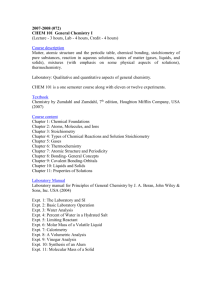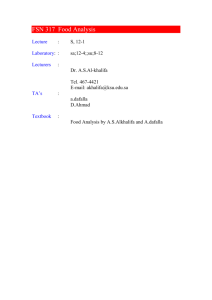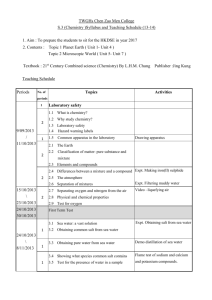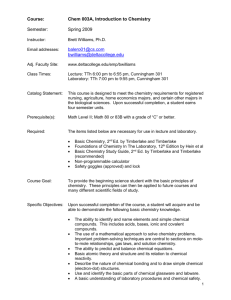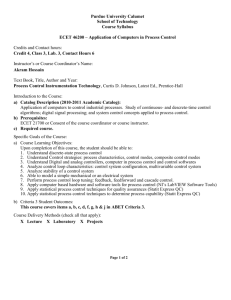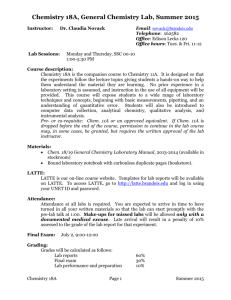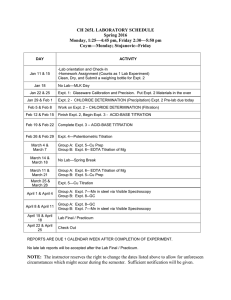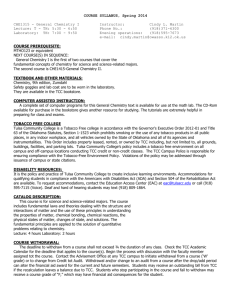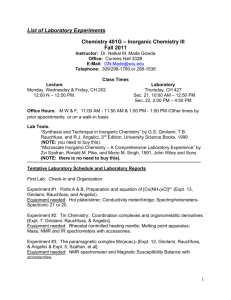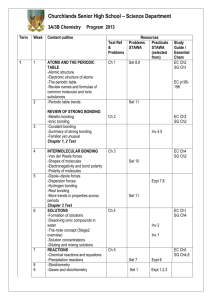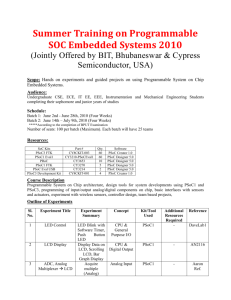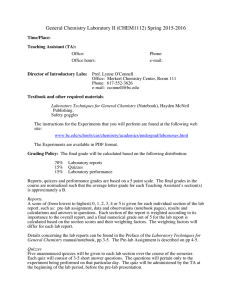CHEM 105L GENERAL, ORGANIC, AND
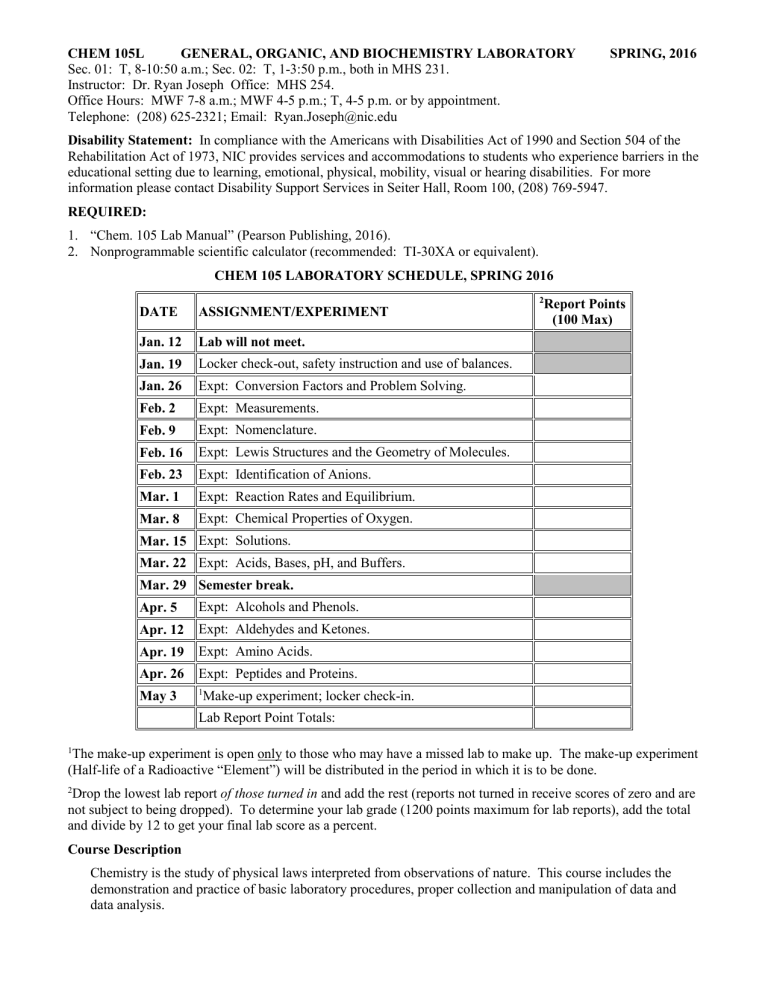
CHEM 105L GENERAL, ORGANIC, AND BIOCHEMISTRY LABORATORY SPRING, 2016
Sec. 01: T, 8-10:50 a.m.; Sec. 02: T, 1-3:50 p.m., both in MHS 231.
Instructor: Dr. Ryan Joseph Office: MHS 254.
Office Hours: MWF 7-8 a.m.; MWF 4-5 p.m.; T, 4-5 p.m. or by appointment.
Telephone: (208) 625-2321; Email: Ryan.Joseph@nic.edu
Disability Statement: In compliance with the Americans with Disabilities Act of 1990 and Section 504 of the
Rehabilitation Act of 1973, NIC provides services and accommodations to students who experience barriers in the educational setting due to learning, emotional, physical, mobility, visual or hearing disabilities. For more information please contact Disability Support Services in Seiter Hall, Room 100, (208) 769-5947.
REQUIRED:
1. “Chem. 105 Lab Manual” (Pearson Publishing, 2016).
2.
Nonprogrammable scientific calculator (recommended: TI-30XA or equivalent).
CHEM 105 LABORATORY SCHEDULE, SPRING 2016
DATE ASSIGNMENT/EXPERIMENT
Jan. 12 Lab will not meet.
Jan. 19 Locker check-out, safety instruction and use of balances.
2 Report Points
(100 Max)
Jan. 26 Expt: Conversion Factors and Problem Solving.
Feb. 2 Expt: Measurements.
Feb. 9 Expt: Nomenclature.
Feb. 16 Expt: Lewis Structures and the Geometry of Molecules.
Feb. 23 Expt: Identification of Anions.
Mar. 1 Expt: Reaction Rates and Equilibrium.
Mar. 8 Expt: Chemical Properties of Oxygen.
Mar. 15 Expt: Solutions.
Mar. 22 Expt: Acids, Bases, pH, and Buffers.
Mar. 29 Semester break.
Apr. 5 Expt: Alcohols and Phenols.
Apr. 12 Expt: Aldehydes and Ketones.
Apr. 19 Expt: Amino Acids.
Apr. 26 Expt: Peptides and Proteins.
May 3
1 Make-up experiment; locker check-in.
Lab Report Point Totals:
1 The make-up experiment is open only to those who may have a missed lab to make up. The make-up experiment
(Half-life of a Radioactive “Element”) will be distributed in the period in which it is to be done.
2 Drop the lowest lab report of those turned in and add the rest (reports not turned in receive scores of zero and are not subject to being dropped). To determine your lab grade (1200 points maximum for lab reports), add the total and divide by 12 to get your final lab score as a percent.
Course Description
Chemistry is the study of physical laws interpreted from observations of nature. This course includes the demonstration and practice of basic laboratory procedures, proper collection and manipulation of data and data analysis.
-2-
Course Outcomes, General Education Abilities and Assessment
Under the guidance of an instructor, you will safely follow laboratory procedures; make observations and record data; properly use the data in calculations and answer questions and draw conclusions that evaluate your understanding of the chemical concepts involved.
General Ed ability satisfied: Critical Thinking and Problem Solving; Mathematical, Scientific and Symbolic
Reasoning.
Assessment: Graded laboratory reports
Weighting System: Lecture 80%
Lab 20%
Lab Component: Reports 100 points each
In calculating the final laboratory percentage, the lowest non-zero laboratory report score is dropped. If a laboratory report is not turned in, a score of zero is recorded and such scores are used in the calculation of the final grade; they are not subject to being dropped.
Grading Policy:
Lab reports : each lab report will be graded on a 100-point basis. The lowest lab report grade of those submitted will be dropped before the average is computed.
The average of the grades on your lab reports will be determined and the result (100-point maximum) scaled to a 200-point basis (the lab contributes 200 points to the overall course total).
No separate letter grade is given for the laboratory class. The score for laboratory work is combined with lecture evaluation results for a single Chem. 105 letter grade. The student must achieve a passing grade in laboratory (
60%) in order to pass Chem. 105.
Laboratory Policy:
1.
A student cannot pass the course without a passing grade in both the lecture and the laboratory.
2.
All students must be present and on time for each laboratory session. Absences from lab result in a score of zero for the lab missed and students who are chronically late for lab may be dropped from the course at the instructor’s discretion.
3.
Do not schedule medical appointments or any other appointments that will conflict with the laboratory period.
4.
Students should study the experimental theory and procedures before coming to the laboratory in order to be prepared to perform the required operations and complete the experiment and report on time.
5.
Proper clothing must be worn at all times . Students arriving to lab without the proper clothing will not be allowed to remain in the lab.
6.
Safety goggles must be worn at all times in the lab unless the instructor announces otherwise. Students who chronically fail to wear proper eye protection will be dismissed from the lab. Wearing contact lenses in the lab is discouraged.
7.
Students may be permitted to work in teams of two or more students to collect data when announced by the instructor but each student will submit an individual lab report.
8.
Lab reports will consist of all pages of the Report Form, found at the end of each experiment. All entries must be neat and legible and made in pencil, not ink . All calculations must show set-ups, correct significant figures, and proper units.
9.
Laboratory reports are due at the end of the period during which the experiment was performed. Cheating on any assignment will result in a zero grade for that assignment.
10.
All experimental work will be weighted equally in calculation of the final laboratory grade. The lowest score received for an experiment report, of those submitted , will be dropped prior to calculating the grade.
11.
Students are required to check-in their locker at the end of the semester or prior to then if the course is dropped. Failure to check-in the locker may result in an Incomplete grade being assigned.
12.
Electronic devices, such as cell phones, pagers and two way radios are not permitted in the laboratory.
They must be turned off before class begins. Failure to do so may result in the dismissal from the laboratory.
13.
Safety procedures must be observed at all times.
Failure to comply with safety procedures will result in dismissal from the laboratory.
